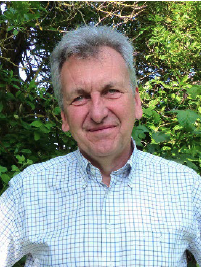Programme
Keynote Speaker | Prof. Dr. Alfons Hamm
We are delighted to welcome Prof. Dr. Alfons Hamm, emeritus professor of Physiological and Clinical Psychology at the University of Greifswald, as the keynote speaker at the European Meeting of Human Fear Conditioning (EMHFC) 2025.
His pioneering research on human fear conditioning, psychophysiology, and emotion dysregulation has profoundly shaped our understanding of fear and anxiety disorders. Prof. Hamm’s work bridges fundamental science and clinical application, contributing to innovative treatments for anxiety-related conditions.
At EMHFC 2025, Prof. Hamm will share his view on decades of fear learning and extinction research, exploring its implications for translational research and clinical practice. His keynote promises to inspire advanced and early career researchers alike, setting the stage for dynamic discussions throughout the conference.

Keynote title: Fear Conditioning: Learning Adaptive Behavior to Environments Predicting Threat
Abstract:
Pavlov´s main contribution to behavioral science was to experimentally demonstrate that inborn visceral and isolated skeletal reflexes can be brought under external stimulus control. Using these classical conditioning procedures of simple motor reflexes, other researchers unraveled the cellular and neural changes of such associative learning processes. While Pavlov´s work became increasingly known across the world it stimulated speculations whether emotional reaction patterns like fear, rage or love could also be conditioned. In their famous case study on conditioned emotional reactions Watson and Rayner found out that complex defensive behaviors could be observed when a previously “neutral” stimulus (a living white rat) was paired in temporal contiguity with a highly aversive “sharp blow”. These complex conditioned emotional reactions were not comparable to the simple visceral and motor reflexes that were investigated by conditioning researchers at those times. Not surprisingly there were big debates whether the procedure employed in this case study would be a classical conditioning study at all. In the current talk I will use the heated debates at those times (e.g., operant vs classical conditioning, debates about optimal interstimulus intervals, what psychological process is related to the conditioned response etc.) to move on to current debates in the fear conditioning community. Starting from the beginnings of fear conditioning both in humans and animals I will argue that from a behavioral science perspective it would be wise to follow Pavlov who encouraged researchers to leave introspective thinking behind. Emotional states like fear are expressed in many different response domains both in the brain and the body that are not always synchronized in time. These responses are elicited when an organism has learned either from experience, observation, or just by information via others including media that a specific environment (or stimulus) increases the risk of the occurrence of specific threat. The defensive adaptation to the expected threat seems to be dynamically organized and also seems to vary according to the behavioral options at hand. In the last part of this talk I will present some implications for a better understanding of anxiety disorders and how these can best be addressed during treatment. Although this concept might be far away from Pavlov´s initial work on simple reflexes I would like to mention that Pavlov already observed a freezing response in his dogs which he related to fear. He observed a reduction of motor reflexes when dogs refused to eat “a passive defensive reflex according to our terminology, or as it would be called ordinarily, a reaction of fear”.
Programme | Monday 12 May 2025
| 11:00 | Registration |
| 12:30-13:30 | Lunch |
| 13:30-13:45 | Welcome note |
| 13:45-15:15 | Symposium 1: Fear extinction |
| 15:15-15:45 | Coffee break |
| 15:45-17:00 | Plenary panel discussion 1: Identifying and bridging translational gaps in fear conditioning research (Moderator: Dr. Maren Klingelhofer-Jens) |
| 17:00-17:30 | Coffee break |
| 17:30-18:30 | Keynote: Alfons Hamm |
| 19:00-20:30 | Dinner |
| 20:30-22:00 | Social event 1: Pubquiz |
Programme | Tuesday 13 May 2025
| 07:00 – 09:00 | Breakfast |
| 09:00 – 10:30 | Symposium 2: Generalization and avoidance of conditioned fear |
| 10:30 – 11:00 | Coffee break |
| 11:00 – 12:30 | Symposium 3: Neurobiology of fear conditioning and extinction |
| 12:30 – 13:30 | Lunch |
| 13:30 – 15:15 | Poster session |
| 15:15 – 15:45 | Coffee break |
| 15:45 – 16:15 | Poster session [continued] |
| 16:15 – 17:45 | Informal organisational meeting & Drinks |
| 18:30 – 20:00 | Dinner |
| 20:00 – 22:00 | Social event 2: Disco bowling |
Programme | Wednesday 14 May 2025
| 07:00 – 09:00 | Breakfast |
| 09:00 – 10:30 | Symposium 4: Methodological variations of the fear conditioning paradigm |
| 10:30 – 11:00 | Coffee break |
| 11:00 – 12:15 | Plenary panel discussion 2: How to facilitate and organize collaborative interdisciplinary open-science research projects. (Moderator: Dr. Bram Vervliet) |
| 12:15 – 12:30 | Awards & Closing |
| 12:30 – 13:30 | Lunch |